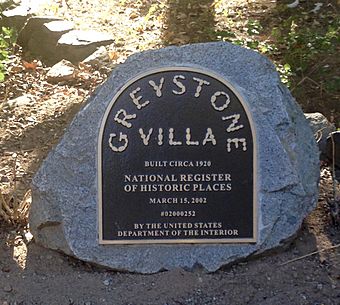Greystone Villa, Cabin 18 facts for kids
Quick facts for kids |
|
|
Greystone Villa, Cabin 18
|
|

Plaque naming the Greystone Villa to the NRHP
|
|
| Nearest city | Santa Ana Mountains, Cleveland National Forest, Orange County, California |
|---|---|
| Area | 0.1 acres (0.040 ha) |
| Built by | Franklyn Z. Phillips |
| Architectural style | Rustic/Folk Art/Craftsman |
| NRHP reference No. | 02000151 |
| Added to NRHP | March 15, 2002 |
Greystone Villa, Cabin 18 is a special old building. You can find it in the Santa Ana Mountains inside the Cleveland National Forest. This area is in Orange County, Southern California. It is so important that it's listed on the National Register of Historic Places. The cabin is close to Hot Spring Canyon and the Ortega Highway (also known as California Route 74).
Contents
The Story of Greystone Villa, Cabin 18
Building a Mountain Cabin
This unique cabin was built a long time ago, between 1929 and 1930. A builder from Los Angeles named Frank Z. Phillips created it. The cabin's style is called "Rustic/Folk Art" with some "Craftsman Features."
Cabin 18 is special because small stones were used to show its number. This stone and mortar building looks a bit like a castle. It is a great example of how buildings were made in Southern California in the early 1900s.
Why Cabins Were Built in Forests
Many cabins like this one were built along the Ortega Highway. This happened because of a law passed in 1915 called the Term Occupancy Act. This law encouraged people to build second homes inside national forests.
The idea was to help the Forest Service become more important. These homes used natural materials found nearby. Builders used trees they cleared and rocks from the area. Large rocks formed the foundations and walls. Smaller rocks were used to decorate the outside.
Forest Homes in California
Having homes for fun in national forests became a big part of history. It showed how the government managed public lands. It also showed how outdoor recreation grew. California was likely the first state where the Forest Service allowed these homes. It definitely became the state where this idea grew the most.
 | Stephanie Wilson |
 | Charles Bolden |
 | Ronald McNair |
 | Frederick D. Gregory |



